#Great Domesday
Text


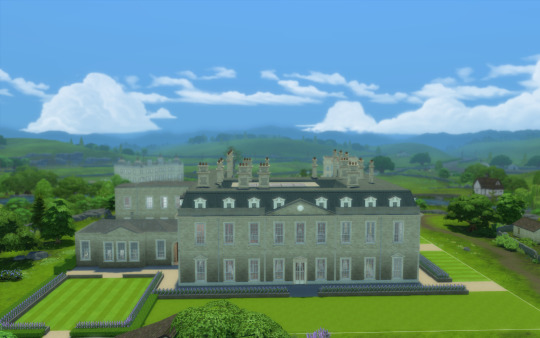
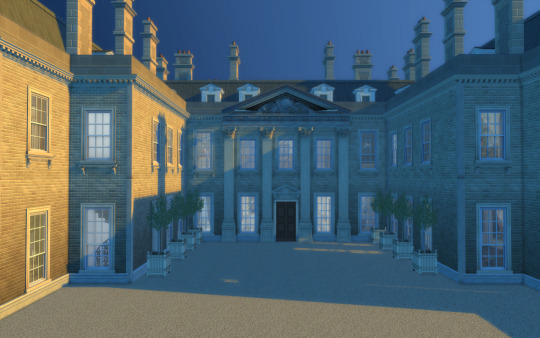

Althorp House, Northamptonshire
Hi guys!!
I'm sharing Althorp House, the seat of Spencer Family. This is one of the most recognizable states in the UK, whose owners have a rich family history.
House History: A hamlet named Althorp existed here in medieval times, believed to have been situated on the southwest side of the park, east of West Lodge. It was first mentioned in the Domesday Book of 1086 as having a population of ten at the time, and being part of the parish of Brington.
In 1469 John Spencer's uncle – also named John Spencer – had become feoffee (feudal lord) of Wormleighton in Warwickshire and a tenant at Althorp in Northamptonshire in 1486. The family's administration of their Northamptonshire and Warwickshire estates gained them admiration and a following throughout England, and their sheep-rearing business earned large profits.[12] After beginning construction of Wormleighton Manor the previous year with some 60 relatives, John Spencer bought Althorp in 1508 for £800 from the Catesby family.
King Charles I is documented to have visited Althorp during his reign. The drawing room was built and the main hall enlarged for the occasion, with £1,300 spent on the banquet, an exorbitant sum for the period.
Robert Spencer built the current house in 1688 and made a series of changes to Althorp park.
More history: https://en.wikipedia.org/wiki/Althorp


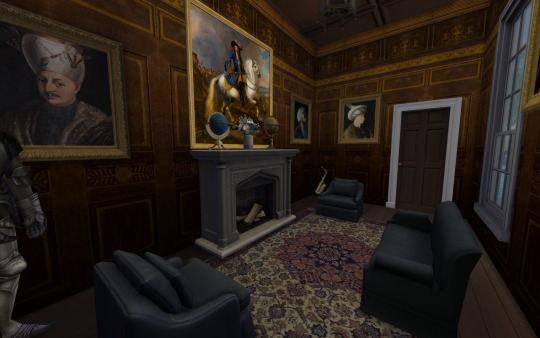

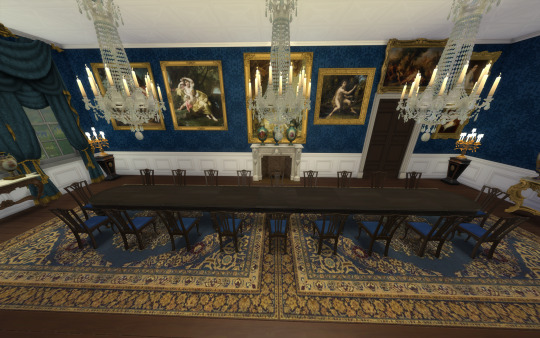
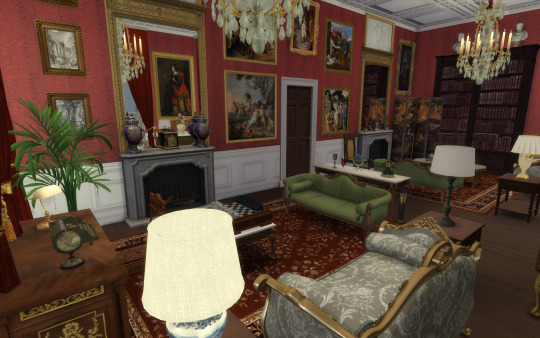
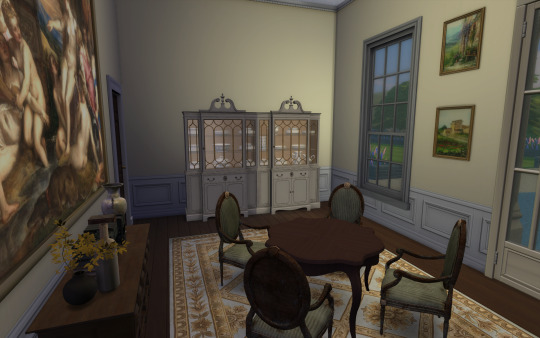

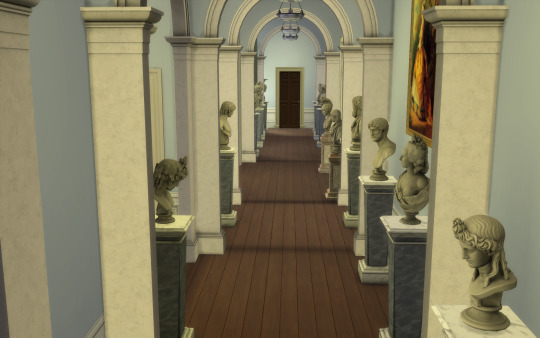
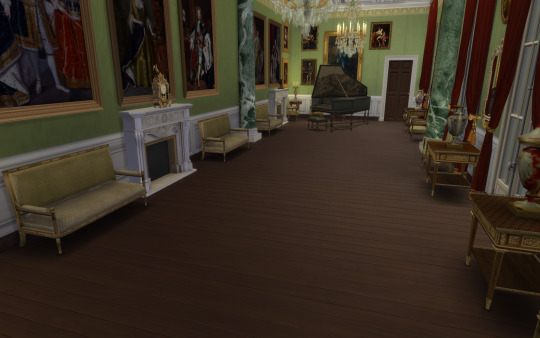


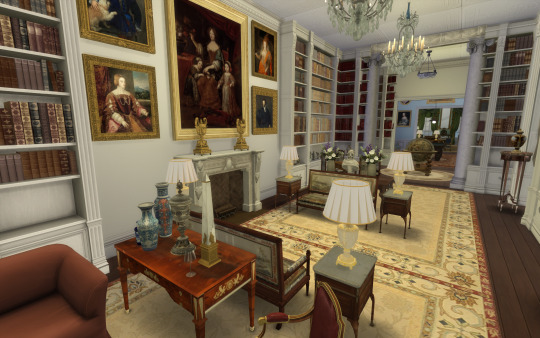
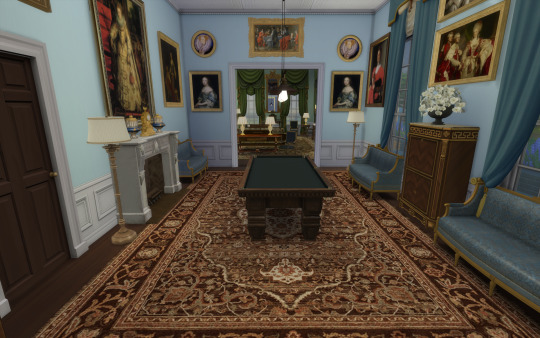

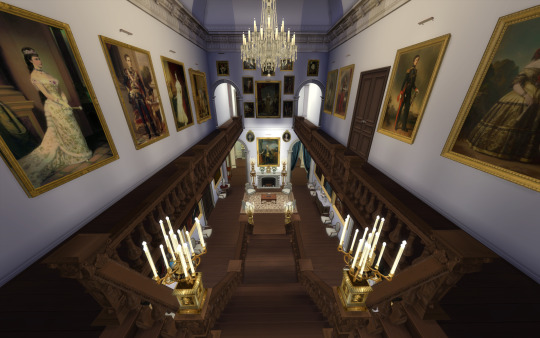


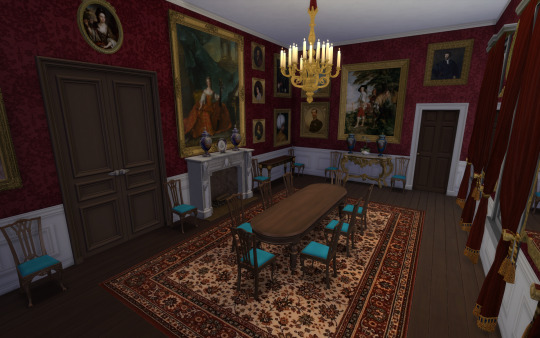
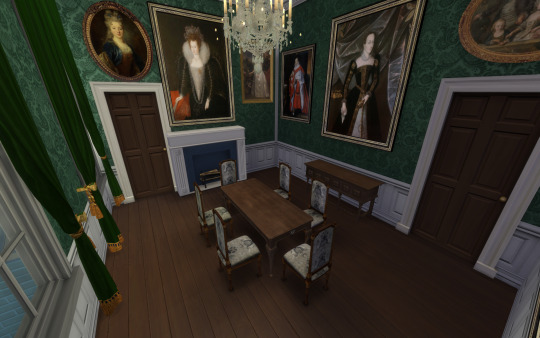
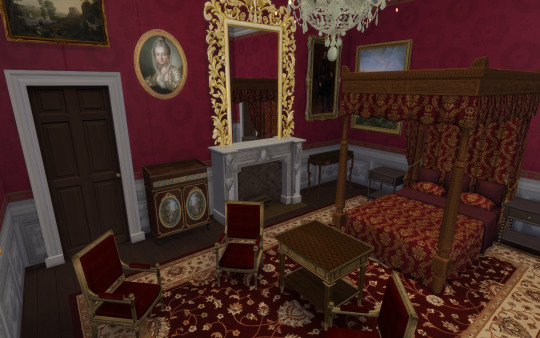



This house fits a 64x64 lot and features the following rooms:
Wooton hall
The painter's gallery
South Drawing room
Billiard room
Long Library
Marlborough room
Sunderland room
State dining room
Principal salon (1st floor) and Spencer's gallery (2nd floor of the salon)
Picture Gallery
Private chapel
The great room
9 Bedrooms/bathrooms
This time I decorated most of the rooms for picture purposes. Hope you like it.
Be warned: I did not have the floor plan for the 2nd floor (Just for the gallery, great room and chapel) The distribution is based on my own decision.
You will need the usual CC I use: all of Felixandre, The Jim, SYB, Anachrosims, Regal Sims, TGS, The Golden Sanctuary, Cliffou, Dndr recolors, etc.
Please enjoy, comment if you like it and share pictures with me if you use my creations!
Early acces: 7/15
#sims 4 architecture#sims 4 build#sims4#sims4play#sims 4 screenshots#sims 4 historical#sims4building#sims4palace#sims 4 royalty#ts4 download#ts4 simblr#ts4#ts4 gameplay#ts4 legacy#ts4cc#the sims 4#sims 4#ts4 screenshots#althorphouse
54 notes
·
View notes
Note
Who are your favourite English monarchs after the parking lot King ?
Okay my list has been pretty consistent throughout the months.
Richard III is obviously number one, S tier king, great guy, just a victim of terrible terrible propaganda that has gone on looong after he’s died. For an example, any book Thomas Moore has done on Richard. I have one of them, and the History of Richard III is basically just a big diss track, considering many of the conditions Moore said Richard had can be easily disproven by looking at his skeleton (I.e. hunchback, having a limp, and a poor arm).
After Richard III my next favorite would have to be Charles II of course (I know very basic), however I don’t agree with him cheating on his wife to get a heir at all. Everything else he did was absolutely perfect. Hair 10/10, Personality 10/10, Demureness and Mindfulness 10/10. He also has the absolute best rap song of the 21st century.
After Charles II, would be George IV. Woah, what’s he doing there? HE HAS EVERY RIGHT TO BE NUMBER THREE ON THIS BANGER LIST!!! Look guys, you’d be pretty pissed too if you were Catholic and had to divorce your wife (which is practically unheard of for a catholic) for some other lady just so your dad (who made buckets if money from what is now the Thirteen Original American States) could pay off your debt. And he’s so based for banning her from his coronation. Hair 8/10 (-2 for balding), Height 10/10, Based levels off the charts/10, Cutie patootie 10/10, Buckingham Palace 10/10.
Usually i’d throw George III into there too but I don’t have a big opinion on him.. so.. HE’S STILL IN HERE! OH YEAH! *spins around* Anyways, he was actually a really good king (not from the colonies’ perspective of course but everything in history has a side) England wise. He gathered up a buncha money (of which George IV spent because he’s a material girl idk) for England. He was actually the only Hanoverian king not to take a mistress so he loved his wife and his wife loves him all up until George eventually died. I think George gets a bit of a bad rep for going insane near the end of his life but he had many many mental problems even beforehand (of which the loss of America exasperated) so I do feel quite bad for him.
Last but certainly first of England’s Monarch, would be William the Conqueror. I love the guy! Super based and cool and stuff, I even have a copy of the Domesday book!! He exploded after dying though which must’ve been disgusting for those at the service.. I mostly like him because I like drawing him (though I’ve only ever posted one drawing of him). His beard is fun to draw.. myehehe.. and the book is cool. Cool death 10/10, cool book 10/10, cool dude 10/10!
Thats like really long but I hope you understand my comprehensive guide
#god damn thats long#im a professional yapper#ermmm what the scallop#williamposting#charlesposting#georgeposting#richardposting#king richard III#king charles ii of england#King George IV#king george iii
10 notes
·
View notes
Text
“…The Anglo-Saxon era is often thought of as having been a golden age for women. Since the late eighteenth century, it has been a commonplace that women in England had better rights before the Norman Conquest than they did afterwards, and were held in higher esteem by society. Before 1066, said one eminent historian in the mid-twentieth century, men and women enjoyed ‘a rough and ready partnership’. As so often with golden ages, however, this picture rests on a selective reading of very limited and debatable evidence. One of its principal props is an account of German women written by the Roman historian Tacitus towards the end of the first century AD. These women, claimed Tacitus, were virtuous, frugal and chaste, and supported their sons and husbands by encouraging them to acts of valour. But this was simply a Roman praising ‘barbarian’ society in order to criticize his own. German women were portrayed as laudable because, unlike their Roman counterparts, they did not conduct adulterous affairs or waste their time at baths and theatres. The reality, unfortunately, seems to be that the status of women in first-century Germany and Anglo-Saxon England was no better than it was in later centuries.”
-Marc Morris, "Anglo-Saxons: The History of the Beginnings of England, 400-1066” / Pauline Stafford, "Women and the Norman Conquest"
Anglo-Saxon England has thus been a Golden Age variously of women's domestication, women's legal emancipation, women's education and women's sexual liberation. The length of a tradition which has changed so fundamentally over time is no guarantee of its veracity. A cursory view of a range of evidence from either side of the 1066 divide casts immediate doubt on the idea of a brutal Norman ending of the Golden Age. The raw statistics of Domesday, for example, suggest a different picture of England on the eve of the Norman arrival. No more than five per cent of the total hidage of land recorded was in the hands of women in 1066. Of that five per cent, 80-85% was in the hands of only eight women, almost all of them members of the families of the great earls, particularly of earl Godwine, or of the royal family. By the tenth and eleventh centuries women other than the queen are virtually absent from the witness lists of the royal charters, and thus apparently from the political significance such witness lists record.”
#anglo-saxons#anglo-saxon england#norman conquest#english history#gender tag#medieval#I don't necessarily agree with Stafford about Henry I#He did name his daughter Matilda his heir but it's not really as simplistic as she makes it seem#We know he remarried soon after his son's death to a young woman who he travelled extensively with her to try and conceive another son#It was only after 5 years when it became clear that he and his second queen weren't having kids that he nominated Matilda#And even then he never shared authority with her (including authority in her own dower lands that HE gave her)#Also as multiple historians have pointed out - while Matilda was his immediate heir it's highly likely that he hoped to live long enough#to directly transfer the kingdom to his eldest grandson#Even some of Matilda's own supporters seem to have viewed the situation in a similar manner - for example the Gesta Stephani states that#Robert of Gloucester viewed Henry Plantagenet as his grandfather's true heir#ie: many contemporaries probably unfortunately viewed Matilda as a 'transitional point' so to speak#So while I do think that Henry I should be remembered as someone who tried to pass the throne to his daughter#I don't really think the picture was as straightforward or as empowering (in a sense) as Stafford paints it as#The reality was much more complex and frustrating and typical of its times#And I do think it does Matilda a disfavour to overlook that
17 notes
·
View notes
Text
There is a Rudyard Kipling poem about a landowner who is frustrated by a tenant who keeps poaching his game. He decides not to prosecute his tenant’s flagrant lawbreaking after he reflects on the many generations of this man’s family who have seen all the other landowners of this patch come and go, from the present reaching back to Roman times.
His dead are in the churchyard—thirty generations laid.
Their names were old in history when Domesday Book was made;
And the passion and the piety and prowess of his line
Have seeded, rooted, fruited in some land the Law calls mine.
I thought of this poem when I saw a viral video of a former member of parliament disputing the very existence of the English ethnicity. The former Labour MP Sion Simon called out the talking head across from him on a news show for contrasting English anti-immigration rioters with Muslim pro-Palestine rioters: “It’s not legitimate to distinguish between Muslims and English. It’s not legitimate to say ‘ethnic English’ versus ‘Muslims.’ We don’t talk like that in this country anymore.” When the man struggled to understand what was offensive about his factual description, Simon prodded him, “What’s ‘ethnically English’ mean?”
Perhaps the former Labour MP has not fully grasped the meaning of “Their names were old in history when Domesday Book was made.” To spell it out: William the Conqueror commissioned the Great Survey a thousand years ago, which is a very long time, yet many English families that still exist today were as ancient to him then as he is to us. It does not get more indigenous than that.
People throw around the G-word flippantly, but surely this deserves to be called genocidal. Americans are frequently told by Kiev’s partisans that it is genocidal rhetoric when Vladimir Putin says Russians and Ukrainians share a common heritage as brother Slavic peoples. Even if he had never killed a single Ukrainian, it would still be genocidal, we are told, because it would deny the Ukrainians their right to a distinct peoplehood. This denial of Englishness is far more sweeping.
5 notes
·
View notes
Text
I wrote this as an opening for another fic which I wound up scrapping, because the reason I wrote it as an intro no longer applies to the story, and it kind of just interrupted the flow otherwise. Now it's just a fluffy oneshot about Bruno and a three-year-old Mirabel. 🌸
------------------------------------------------------------------------
Bad Vision
There was a knock on Bruno's door.
That was surprising. Nobody really visited Bruno - not without an appointment, anyway, since nobody liked to surprise-visit the local domesday prophet. He worried his mother wanted something - would she have knocked? - when the door uneasily opened and revealed Mirabel, the doorknob barely reaching her chin.
"Tío Bruno!" she said happily, as though seeing him in his own home was a surprise.
Mirabel was turning four. She was easily the star of the family, and certainly the apple of her grandmother's eye. She was, even at the age of three, talkative and doggedly helpful. Everybody in town loved her - intelligent for her age, cute as pie, and toddling after them happily, saying: "What's that?" and, "You're really good at selling things" and, "I want to do that when I grow up." Alma took her interest in people as a sure sign that she'd grow up selfless and dedicated; Bruno, on the other hand, observed that Mirabel was good at relating to adults because she wasn't good at relating to other kids. He had a suspicion she'd grow up to be socially awkward, although Alma would probably disapprove.
"Hello?" he said, as she hugged his knees like she hadn't seen him at least a few days ago. "What are you doing here, Mirabel?"
Bruno hadn't asked the kids not to talk to him, but evidently someone had, because his sobrinos never really came in here. And, indeed, he never left. Mirabel had forgotten about him and was admiring the patterns on his walls.
"I need a vision," she said happily.
Bruno's chest tightened a little. "W-who told you that?"
Not his mother. Please not his mother. He'd always been afraid she'd demand to know Mirabel's Gift in advance. Couldn't he watch Mirabel grow up in real time like everybody else?
Mirabel seemed unbothered. "Camilo did."
Oh. That was less worrying. If it was Camilo then it was probably about that night's dinner. Bruno let out a sigh of relief.
"What do you need a vision about, mija?" he asked.
"I can't read."
Bruno suppressed a smile. "But you're only three, Mirabel, you'll learn to read when you're older."
He went to stand next to her as she stared up at the murals. She took his hand and began to swing it gently.
"No," she insisted, "I can't read."
He was puzzled. "I... promise you will learn to read eventually. I'm sure you'll be great at it."
Mirabel took on the patient cadence of her mother explaining something complicated. "But I need a vision from you, or I won't be able to do it."
Bruno scratched his head.
"Would you like me to teach you to read?" he said eventually. "We wouldn't have to use a vision. We could just... use a book."
Mirabel brightened up. "Okay!" she said. "Did you draw this picture?"
She pointed up at the mural on the wall. Bruno chuckled.
"No, I didn't. Casita did."
"I think it's pretty."
Bruno was heartened to hear that; Pepa constantly called his room's decor 'creepy'. "I think so too."
"Can I touch it?"
She had apparently forgotten about learning to read. Bruno picked her up under the arms, surprised to find she was much heavier than he'd remembered, and grunted as he held her up to see the wall. She reached out a hand, beaming, and ran it along the lines. Then she giggled.
"I'm tall," she said.
"You'll probably be this tall when you're older," Bruno told her, the wisened words of a man whose sisters were both taller than him. "Then you'll be able to touch the carvings by yourself."
"I'm four tomorrow!" she declared.
"Tomorrow?" Oh no, it was tomorrow. He had no idea where the time had gone. "I-Is that right? What are you going to get for your birthday?"
"A vision," she said happily.
"I don't think," he began, then sighed. "What about a book? A book with nice pictures like these."
"Yeah!"
He perched her on his hip, and she wrapped her arms around him as he took her to see the next mural. She was, admittedly, a little heavy for this process, but it wasn't like he was getting much exercise otherwise.
"When I can write, I'm going to write a book," she said.
"A book about what?"
"You and me and Luisa and Isabela," explained Mirabel, "And Casita."
"Me? In the book?"
"Yes," said Mirabel firmly, "You'll be in the book, making things."
"What kinds of things?"
"Nice pictures on walls, like these."
Bruno chuckled and shook his head. "Yeah, alright."
Bruno's door swung open again. Bruno found himself freezing, as though he'd been caught doing something wrong; it was only Camilo, though, the other little sobrino, striding in like he owned the place.
"Why are you here?" he demanded.
"So I can read," said Mirabel, "Tío Bruno says he can teach me."
"No he can't," said Camilo, "You can't read."
Mirabel's lip wobbled. Bruno wished his problems were as simple and Mirabel and Camilo's.
"Tío Bruno can give me a vision," said Mirabel, "Then I'll be able to read."
"It's his fault!" shouted Camilo. "Tío Agustín says you can't learn to read because you have bad vision!"
Bruno burst into laughter. By the looks both Mirabel and Camilo were looking at him, they didn't get it at all.
"Mirabel," he said, "For your birthday, why don't we get you a pair of glasses, like your dad's? Then we could fix your vision."
Mirabel cheered up immediately at this. She put her fingers to her face and made a glasses shape. "Like Pa's?"
"Yes, like those! They could be your special birthday glasses. How would that be?"
Mirabel smiled brightly.
"I want glasses too!" Camilo cried, tugging the end of Bruno's ruana.
Bruno suppressed a bark of laughter. "I give people bad visions, Camilo, not bad vision! And anyway, your birthday's already done!"
"I want orange glasses!" Camilo was practically ripping the ends off the ruana. Bruno had to tug them out of his hands.
"I want my glasses to be green," said Mirabel happily, "Like Tío Bruno."
"Like Tío Bruno, huh?" said Bruno, grinning.
Mirabel took Bruno's hand, and Camilo, seeing that he was being left out, took the other.
"We have to tell Pa!" said Mirabel.
"You have to make it happen!" insisted Camilo.
Bruno chuckled and - for once in his life - let the kids pull him out of his room. He had to admit, they were a lot of fun. He could get used to this.
108 notes
·
View notes
Note
i used to live in tring, hope u enjoyed the train ride through lol :3 it has a nice park and not much else otherwise, not a bad place to live & not far from London which is nice,, the town dates back to prehistoric times & was mentioned in the Domesday Book too so it’s defo existed for a while hehe,, fun fact, George Washington’s great grandad was born there too,, anywho pls enjoy this useless info, my brain was activated by the unexpected mention of somewhere I know lol
oh cool!! I love this! you learn something new every day
#now i know about tring!!#thanks anon genuinely neat#thoughts#ask#anon#i didn't actually go all the way out to tring i got off only a couple stops on but maybe someday I'll go there
10 notes
·
View notes
Text

Ruins of Richmond castle
Richmond Castle in Richmond, North Yorkshire, England, stands in a commanding position above the River Swale, close to the centre of the town of Richmond. It was originally called Riche Mount, 'the strong hill'. The castle was constructed by Alan Rufus from 1071 onwards following the Norman Conquest of England, and the Domesday Book of 1086 refers to 'a castlery' at Richmond.
In the 12th century, his great-nephew Conan expanded the castle and built the keep. Although it was derelict by 1540, it was restored centuries later. The property is the best-preserved early Norman castle in England and an important tourist attraction.
#Richmond castle#England#North Yorkshire#Richmond#11th century#Norman era#historic#travel#tourist attraction#castle
10 notes
·
View notes
Text
The Reigate Squire
This has three different titles - "The Adventure of the Reigate Squire", "The Adventure of the Reigate Squires" and "The Adventure of the Reigate Puzzle". The first is from The Strand, the second is the book title and the third is the American title from Harper's Weekly.
This is from the second "volume" released in book form - The Memoirs of Sherlock Holmes and the fourth one in the LFW series from there.
Telegrams were the rather expensive text messages of the 19th century. Holmes likely asked someone at the hotel to send one to Watson and the postman would drop it at 221b Baker Street.
Watson could get to Lyons (or Lyon) in France in under 24 hours via train-ferry-train-train (Charing Cross-Dover-Calais-Paris-Lyon) for the price of £4 2s 6d second class and £5 9s 9d first class, not counting any supplements for a sleeping car berth. The South Eastern Railway sold through return tickets. Adjusted for inflation, he's looking at around £410 in the former and £550 in the latter. You might pay around the same today at short notice, but for much faster journey.
Railways also employed interpreters at major stations to aid travellers.
Hotel advertisements from this period are great fun. The RL Lyon hotels in the 1887 Bradshaw's on Timetable World include noteworthy things like a garden, a piano, a lift and the provision of foreign newspapers.
Reigate is a town about an hour by train from London Victoria in 1887. Today, you could do the entire journey from Baker Street in under an hour.
Reigate itself is an affluent commuter town in Surrey located just outside the modern M25 motorway and has been around long enough to be recorded in the Domesday Book, William the Conqueror's census/tax assessment of England in 1086. Much of it was still rural at the time.
Cunningham senior is a magistrate. He's not the first dodgy magistrate we've encountered - see "Gloria Scott" and we need a counter for that.
"Help! Help! Murder!" is the kind of thing you often see in Victorian literature - and crime reports from that period.
British police officers were not routinely armed with handguns at this point and still are not - the truncheon would prove sufficient for most situations.
A carafe is a glass container with a flared lip for serving liquids. It is not a decanter, which has a stopper.
Holmes' use of powder burn evidence for busting the Cunningham's story is a very early use of a forensic technique now taken for granted in crime stories.
Both Cunninghams will likely hang for this murder. It's pre-mediated and the fact the former is a magistrate is an aggravating factor if anything.
31 notes
·
View notes
Text
Episode 18: Olivia Baskerville on the Great Survey, the Greek New Testament, and the history of England


Pages from the Codex Sinaiticus (l) and The Domesday Book (r)
In Episode 18 of Inside My Favorite Manuscript, we have a two-fer! Dot and Lindsey chat with Olivia Baskerville about her two favorite manuscripts: The Domesday Book and the Codex Sinaiticus. The Domesday Book, completed in 1086, documents a tax survey taken of most of England and parts of Wales after the Norman Conquest, while Codex Sinaiticus is a complete copy of the New Testament, written in Greek in the 4th century and sold to England by the Soviet Union in 1933. While very different in form and content, both manuscripts have played important roles in English culture, and we'll spend most of our time talking about the politics surrounding their creation and use over the course of England's history.
Listen here, or wherever you find your podcasts.
Below the cut are more images and links relevant to the conversation.
The Domesday Book at the National Archives (includes digitized images taken from the 1986 photographic facsimile, free to download in PDF format if you sign in)
Open Domesday (includes digital images taken from the 1850s photozincographic reproduction of Domesday, made by Ordnance Survey in Southampton. As Andrew Prescott points out on Twitter, the plates used to make this facsimile have been cleaned up and some marginalia removed)
Page of the Domesday book showing Bedford in Bedfordshire (image from the National Archives)

Codex Sinaiticus (transcription and digital images)
Codex Sinaiticus fol. 217b, the opening of the Book of Mark

The same page within the context of the website, transcription and translation on the right.

Example of a Canon Table from British Library Burney 41, f. 19v. From left to right, Matthew, Mark, Luke, and John showing the divisions that were used before the invention of the modern system of chapter and verses. The numbers in the columns will be written alongside the text in the main part of the Bible. (Wikipedia page on Eusebian Canons)
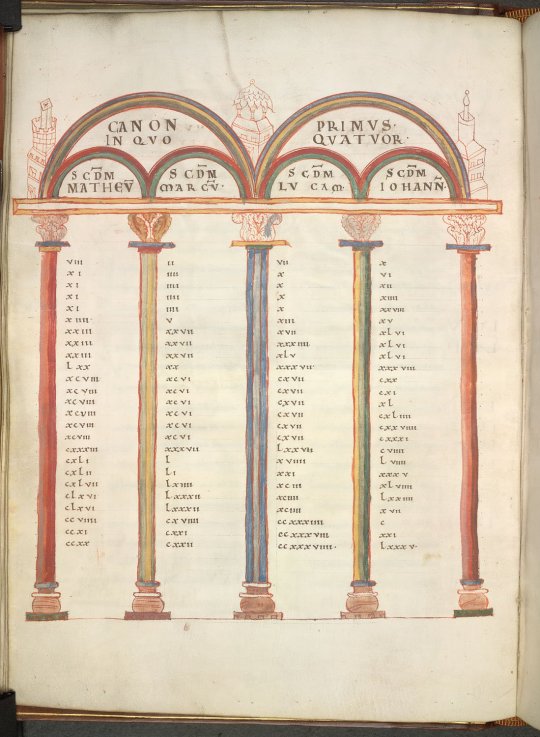
The canon table that Olivia mentioned, from the Codex Amiatinus (digitized online at the Library of Congress)

Codex Sinaiticus fol. 217b, zoom in on the bottom right under standard light.
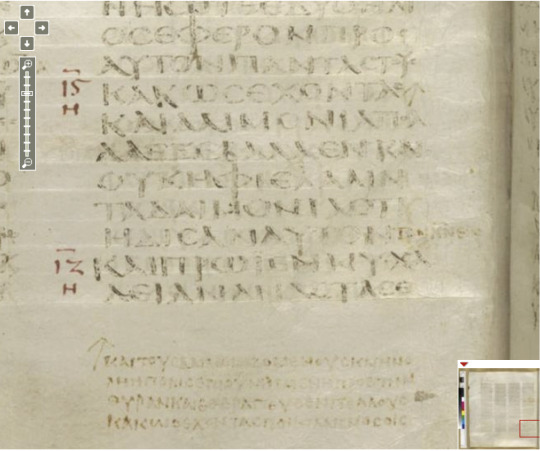
Codex Sinaiticus fol. 217b, zoom in on the bottom right margin under raking light. The ruling is so clear!
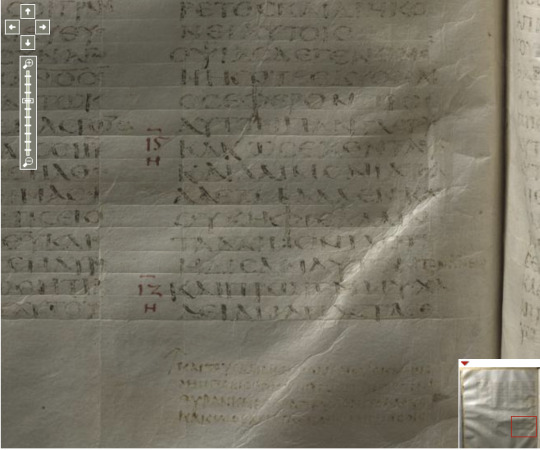
Wikipedia page on the Soviet sale of paintings from the Hermitage Museum (which happened around the same time that the Codex Sinaiticus was sold)
Newsreel Footage of Codex Sinaiticus from 1933, blog post by Brent Nongbri includes the movie footage embedded.
The CULTIVATE MSS project (2019-2024), funded by the European Research Council, explores how the trade in medieval manuscripts between 1900 and 1945 affected the development of ideas about the nature and value of European culture during this period. (Project website)
The Cost of Culture, the podcast of the CULTIVATE MSS project
#medieval#manuscript#england#history of england#codex sinaiticus#domesday book#nationalism#latin#greek#cultivate mss project#podcast#inside my favorite manuscript#imfmpod
21 notes
·
View notes
Text
In light of all the horrid stuff going on in this country lately, I would just like to remind everyone that england isn’t a totally terrible place!!
This country is full of beautiful architecture, art, literature, and natural beauties that are sometimes hard to believe are real.

This is the Major Oak of Sherwood Forest, and is estimated to be as much as 1100 years old!! It is estimated at 23 tons, and is 33 feet in girth/10 metres. According to local folklore, it is the tree where Robin Hood and his merry men slept when in the forest.

This is Durdle Door, in Dorset. It’s a natural limestone formation on the jurrassic coast, which was deemed “of such international geographic importance” that it was England’s first foray natural World Heritage site with UNESCO in 2001, joining the Grand Canyon and the Great Barrier Reef (visit-dorset.com)
As for architecture, we have the iconic Highclere Castle

Most well known for its use in iconic historical drama Downton Abbey, first written records of the Highclere estate date back to the year 749 when the estate was granted to the bishops of Winchester. In the late 14th century the bishop of Winchester William of Wykeham built himself a palace on the property, and was taken by Edward VI during the reformation in 1551. It was then granted to the Fitzwilliam family, rebuilt in 1679 by then owner Sir Robert Sawyer, who then bequeathed it to his daughter Margaret, first wife to the 8th earl of Pembroke, Thomas herbert, and it remains in the hands of the Herbert family to date, albeit the branch that resulted in the current Earl of Carnarvon. It was redesigned in the years 1842-49 to the facade we know today. (Quick side note, I am directly related to the herbert family through my great grandfather, so carnarvon I’m coming for you watch out)
We also have of course, the ever iconic Chatsworth house

IYKYK. Jk this incredible house is most well known for its use as Pemberley, the Derbyshire residence of Mr Darcy in the 2005 production of Pride and Prejudice (the best film ever made thank you very much).
The Manor of Chetesuorde is listed in the Domesday Book of 1086 as property of the crown in the custody of William de Peverel. Chatsworth ceased to be a large estate until the 15th century when it was purchased by the Leche family. They enclosed the first park and built a house on what is now the south east part of the gardens. The lands were sold in 1549 to Sir William Cavendish, husband of Bess of Hardwick (who was the “keeper” of Mary Queen of Scots while imprisoned. Also apparently her grandson married ANOTHER of my ancestors so I’m related to her too?? What the fuck I need to stop learning family history on the fly). Bess began to build her own home on the property from 1553 to the 1560s.
The home was renovated a truly mindboggling amount of times, as is the amount of times it changed hands. So I’ll keep it simple. A great number of important changes were made by the 4th duke of Devonshire, greatly changing the layout of the home. His son would marry Georgiana Spencer, 4 times great aunt of princess Diana (and YET ANOTHER RELATIVE OF MINE! From another branch of the family!! I need to call my mother. And update my ancestry.com).
In 1811 the 6th duke of Devonshire inherited Chatsworth, and proceeded to transform it into the wonderful beacon of regency romance we know and adore today over the course of his stewardship over the property.
These are only four incredible natural and historical landmarks in England. There are so many more that I could spend 3 life times researching!! (And so many more that have nothing to do with my family history, I promise. Swear I wasn’t doing this on purpose lmao)
This country can be a fucking nightmare, but it’s also a beautiful country with incredible sights and history, and I think we do ourselves a disservice when we forget that. It’s okay to love England (I fucking adore this country you have no idea, wouldn’t be running a blog if I didn’t!), you aren’t a bad person or supporting the bad shit we’ve done if you are proud of being English.
Because don’t get me wrong this country has perpetrated some of the worst shit in history, but we’ve also contributed some of the most important literature and scientific discoveries ever!!
Mary Anning revolutionised the field of paleontology!! Mary Shelley started the entire sci fi genre. Steven hawkin, Charles Darwin, Dorothy Hodgkin and Rosalind franklin discovered DNA! Isaac Newton, William Blake, John Keats, Byron, Alan Turing, Branwell, Charlotte, Emily, and Anne bronte, Dante Gabriel Rossetti, John Everett Millais, John William Waterhouse, to name a few merely off the top of my head!
England can be a wonderful place, and our heritage can be incredible and a legacy to be truly proud of. It would not do to forget, however, that a lot of our history would not have been possible without queer and ethnic minority groups. We all know a good deal of English wealth came from the slave trade, female scientists and artists often had credit for their work stripped from them and given to husbands or even strangers, and a good number of our most influential scientists and artists were very notably queer who were treated incredibly poorly and sometimes killed, and these are facts that can and do exist simultaneously.
Our heritage is wonderful, but it is still being made today. Things that we do now will be landmark events for our descendants, and it is our duty to do better for this country than our ancestors.
#long ass post sorry#I’m In A Mood today#apologies for the absolutely bizarre turn into my family history I genuinely did not expect to be related to like everyone involved in this#i severely underestimated how intertwined the nobility is#I would love to chat with anyone about some fascinating bits of English history they know and am happy to elaborate on anything I possibly#can!#politics#english history#chatsworth house#highclere castle#dorset#sherwood forest#english culture#trans rights#durdle door#can’t tag everything or I’ll be here all day#Admin Roe
51 notes
·
View notes
Text
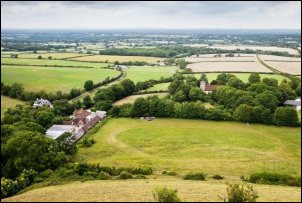
When Julius Fabricius, Sub-Prefect of the Weald, In the days of Diocletian owned our Lower River-field, He called to him Hobdenius—a Briton of the Clay, Saying: "What about that River-piece for layin' in to hay?"
And the aged Hobden answered: "I remember as a lad My father told your father that she wanted dreenin' bad. An' the more that you neeglect her the less you'll get her clean. Have it jest as you've a mind to, but, if I was you, I'd dreen."
So they drained it long and crossways in the lavish Roman style — Still we find among the river-drift their flakes of ancient tile, And in drouthy middle August, when the bones of meadows show, We can trace the lines they followed sixteen hundred years ago.
Then Julius Fabricius died as even Prefects do, And after certain centuries, Imperial Rome died too. Then did robbers enter Britain from across the Northern main And our Lower River-field was won by Ogier the Dane.
Well could Ogier work his war-boat—well could Ogier wield his brand— Much he knew of foaming waters—not so much of farming land. So he called to him a Hobden of the old unaltered blood, Saying: "What about that River-piece; she doesn't look no good ?"
And that aged Hobden answered "'Tain't for me to interfere. But I've known that bit o' meadow now for five and fifty year. Have it jest as you've a mind to, but I've proved it time on ' time, If you want to change her nature you have got to give her lime!"
Ogier sent his wains to Lewes, twenty hours' solemn walk, And drew back great abundance of the cool, grey, healing chalk. And old Hobden spread it broadcast, never heeding what was in't— Which is why in cleaning ditches, now and then we find a flint.
Ogier died. His sons grew English—Anglo-Saxon was their name— Till out of blossomed Normandy another pirate came; For Duke William conquered England and divided with his men, And our Lower River-field he gave to William of Warenne.
But the Brook (you know her habit) rose one rainy autumn night And tore down sodden flitches of the bank to left and right. So, said William to his Bailiff as they rode their dripping rounds: "Hob, what about that River-bit—the Brook's got up no bounds ?"
And that aged Hobden answered: "'Tain't my business to advise, But ye might ha' known 'twould happen from the way the valley lies. Where ye can't hold back the water you must try and save the sile. Hev it jest as you've a mind to, but, if I was you, I'd spile!"
They spiled along the water-course with trunks of willow-trees, And planks of elms behind 'em and immortal oaken knees. And when the spates of Autumn whirl the gravel-beds away You can see their faithful fragments, iron-hard in iron clay.
Georgii Quinti Anno Sexto, I, who own the River-field, Am fortified with title-deeds, attested, signed and sealed, Guaranteeing me, my assigns, my executors and heirs All sorts of powers and profits which—are neither mine nor theirs,
I have rights of chase and warren, as my dignity requires. I can fish—but Hobden tickles—I can shoot—but Hobden wires. I repair, but he reopens, certain gaps which, men allege, Have been used by every Hobden since a Hobden swapped a hedge.
Shall I dog his morning progress o'er the track-betraying dew ? Demand his dinner-basket into which my pheasant flew ? Confiscate his evening faggot under which my conies ran, And summons him to judgment ? I would sooner summons Pan.
His dead are in the churchyard—thirty generations laid. Their names were old in history when Domesday Book was made; And the passion and the piety and prowess of his line Have seeded, rooted, fruited in some land the Law calls mine.
Not for any beast that burrows, not for any bird that flies, Would I lose his large sound counsel, miss his keen amending eyes. He is bailiff, woodman, wheelwright, field-surveyor, engineer, And if flagrantly a poacher—'tain't for me to interfere.
"Hob, what about that River-bit ?" I turn to him again, With Fabricius and Ogier and William of Warenne. "Hev it jest as you've a mind to, but"—and here he takes command. For whoever pays the taxes old Mus' Hobden owns the land.
-The Land, "Diversity of Creatures"
6 notes
·
View notes
Text
Domesday
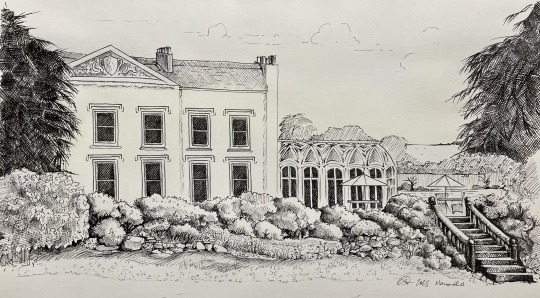
MANOR HILL HOTEL and Day Spa sits up past Alfriscombe’s headland, a decorative shell formed gradually over the centuries around the core of the original medieval manor house. For centuries this was the family home of the Vernons, able to trace their noble line back to the Norman conquest and beyond, but a combination of expensive tastes, a series of disastrous investments and a few unlucky runs at cards forced them to sell up and retreat long ago.
It still has the air of a grand house, if you can overlook the Michelin star plaques screwed to the stonework beside the main entrance and the ‘[NO] Vacancies’ sign creaking on its gibbet down by the main road. The sweeping carriage drive still follows the curve of the manor’s boundary wall, taking new arrivals past well-kept gardens and grand views over the bay before dropping them at the front door. The frontage is all late Regency, clean and white in the spring sunshine with row upon row of identically sized sash windows, while newer extensions at the rear house guest bedrooms overlooking the back lawn, neatly clipped evergreens, and beyond that ancient woodland with the crown of Fairy Hill rising up out of the trees in the distance. In short, picturesque as all hell from every possible angle. Little wonder the first Baron Vernon chose this spot to cement his triumphant land grab post-Conquest.
The grand ballroom jutting off the south-east side is a Victorian addition from the family that owned it briefly until their only son was lost in the Great War. One of the bedrooms is still preserved as a shrine to his memory, the life’s work of his grieving parents, even his uniform laid out as if ready for him to return and don it before he heads off to victory. Mainder struggles to remember that family’s name, to his occasional shame. Not Vernon, certainly, and he had nothing to do with their misfortunes, but still. Maybe he’ll drop by the display later and remind himself. It feels like the right thing to do.
The only visible remnant of the medieval hall in these modern times is a wide Gothic arch just inside the front door. The old lord’s motto just manages to assert its presence if not its meaning, shallow scratches in the fragile sandstone barely legible now; HABEMVS TENEMVS, it used to say. A brief smirk ghosts across his face as he passes under the inscription and wipes his muddy feet thoroughly on the logo woven into the doormat. Initially dismayed when the hotel decided to adopt the Vernon coat of arms as part of their branding, between the threat of lawsuits and the enthusiasm of the fancy graphic designer they hired it ended up almost unrecognisable, with details like the lion passant the Vernons were once so peacock-proud of replaced by nothing more than a stylised scribble beneath the shield. The absolute cherry on the cake is knowing that it appears not just on doormats, not just printed on restaurant menus and crockery and the tiny guest soaps in the rooms, it’s even embossed on the luxury quilted toilet paper. Odds are that someone at that very moment is wiping their arse on the Vernon crest, and he couldn’t have devised a more fitting use for it if he’d tried.
This early in the year it’s sparse business, with the Valentine’s Day offers over and done with and the Spring Bank Holiday trade yet to materialise, but those guests who do make the trip tend to be heavily susceptible to impulse buys from the trinkets displayed at the treatment centre desk. He stops to admire, as he always does, the sheer artistry at work in arranging the showcase, each shelf in the display containing precisely the correct number of tempting items, not too crowded and not too sparse, all angled to sparkle just so under the cabinet lights.
Looking more closely though there are a few gaps. “You managed to shift that geode.”, he remarks, reaching into his coat pocket and flipping open his notebook. “Want me to send up another? Anything else you’re out of?”.
He’s left hanging when the young woman at the desk holds up a ‘wait’ finger and darts into the tiny office behind the desk. “All of the rose quartz.”, her voice echoes back to him. “Most of the pendants …”. She reappears with a handwritten list which she pushes across the desk for him to review. “Pretty much all of the fossils. Here you go. We had a big rush on over Valentine’s Day.”.
He raises his eyebrows, scribbling swift notes as he works his way down the extensive list. “No kidding. Who says romance is dead?”.
“Certainly not me!”.
The cheeky smile she shoots at him doesn’t go unnoticed, but he lets her flirting pass without comment. Gratifying as it was when he overheard that the young ladies at the spa reception desk ‘totally would’ even if he is ‘like, really old’, the days are long gone that he’d consider taking them up on it.
Back before the Closing his two chief duties were monitoring the Fold for strays and wanderers, and keeping track of the yasim, the half-bloods seeded year on year by the constant traffic between the two sides. He’d barely had to stir himself on that front in the last two centuries. Maybe there are more green eyes in Alfriscombe than you’d expect in such a small population, a bit more luck on the scratch cards or the horses. Realm blood leaves its mark. But these days there isn’t one that he could pick out of a crowd, the aura about them that says they’re someone he needs to watch over. Certainly there are none of his get. He hasn’t even had a relationship on this side for how long he can’t even remember for precisely that reason, and he’s not about to start now.
Business concluded, he ducks down the corridor in the direction of the events suite. Hotel management chose to decorate this section with a selection of tasteful prints in unfussy dark wood frames showing scenes from the history of Alfriscombe. He stops to admire what’s in his opinion the best of the lot, delicate ink lines and cross-hatching showing a view of the town from, if he remembers correctly, 1857. Yes, that’d be right; the pier hadn’t been built yet, and the old Abbey schoolhouse, one of the only victims of the fire of 1860, is still standing. Memory supplies the scene - the blaze and its aftermath, nobody hurt but the building itself reduced to smoking rubble - handwringing from the diocese and mutterings from the vicar about God’s mysterious ways. In truth God had very little to do with it, but he’s confident She would have approved of the outcome, if not the methods. No more kids being singled out at the teachers’ whim, mysterious discipline delivered behind closed doors strictly one on one leaving boys pale and tearful and resolutely silent. Not in his town. He still counts that as one of his better days’ work.
A couple of steps onward he halts again, head cocked as if listening to an unseen navigator, and apparently on impulse takes a sharp right into Hotel Staff Only territory, a service corridor providing hidden access to the function rooms and the restaurant. As such it’s an unloved, undecorated space designed for actual work to get done, safely out of sight of paying guests. Plush carpet underfoot gives way to easy-to-mop vinyl in dull blue. Utilitarian plastic skirting protects the bare plaster walls from the heavy catering trolleys, inclined to rumble on unchecked if you let go even for a moment. One such appears as he reaches the bend, and he stops close into the wall to let it go rattling past. The tiny young woman struggling to steer the beast nods breathless thanks and carries on her way.
Further down there’s the murmur of voices from an event in progress. More of the staff are in full action mode here, smartly kicking open the kitchen doors to bustle past and around him with water jugs and trays of coffee cups, but they pay him no attention beyond the occasional nod of greeting. They all know him, local kids grown up playing hopscotch or bulldog in the alley behind his shop, and for all his many faults he never could bring himself to be a dick to children. It works out nicely; they have nothing but positive associations with him, and this wouldn’t be the first time he’s taken advantage of that fact to use their domain as a shortcut.
He emerges precisely where he needs to be, the atrium at the centre of the function rooms. They're busy laying it up for the first break, and he drifts aside to keep out of the way, helpfully picking up a discarded lanyard from the floor. A sign propped on the easel by the other door proclaims that today’s series of seminars are on the subject of ‘Alfriscombe: Past, Present and Future’, and are kindly sponsored by the Warrington Institute.
He barely glances at it. There’s news to be had here today, but that isn’t it.
#fantasy#fiction#books#somewhere to be#reading#faerie#gnu terry pratchett#goodreads#storygraph#booklr#one chapter at a time
2 notes
·
View notes
Text


FLORIDA - FOOD ASSISTANCE - SNAP
NEW - WEBSITE
MY ACCESS . MY FL FAMILIES . com
WENT - 2 - PROVIDERS - APP
CHANGED - MY ZIP CODE
WENT - 2 - WEBSITE - LINKED - MY
BENEFITS
WHEN - I - DID - STATUS - WENT
2 - 2ND - PART - NO 2 - NOW - A
CASEWORKER - WILL - REVIEW
SHORTLY - HOORAY
WILL - GET - BENEFITS - 22 MAR
AFTER - ALL - PROVIDERS - APP
TYPED - MY - CASE NO
SAME - AFTER - YEARS
BENEFIT - AS - HOMELESS
TOTAL - $67
HAD - 2 - RE-APPLY - FOR
PAPERLESS - AND - TEXT
THEY'RE - NOT - GREAT
WITH - THAT - SAW - MY
PAST LETTER - JAN 2024
FORGOT - THAT ADDRESS
SO - LONG - AGO
MIAMI - OVER - 1 YEAR
SAW - AGAIN - MY - HE IS
A - WOMAN - AND - SAID
'HIS - OTHER - HALF'
CAN - EXPERIENCE - YES
BEING - A - MAN - TOOLS
SO - CAN - WEE WEE LIKE
A - MAN - WITH - RUBBER
BODY - PARTS - FR
AMAZON - ALSO
WHO - GIVES - FOOD - TO
US - WEDNESDAYS
GAVE - HIM - $200
AMAZON - GIFT - CARD
SO - THEY - BOUGHT
BODY - PARTS
FAKE - BOOBS - 4 HIM
FAKE - MALE - RUBBER
PARTS - SHE - CAN YES
WEAR - 2 - WEE WEE
LIKE - A - MAN
$200 - WOULD - HAVE
BOUGHT - ME - SWIMWEAR
PINK - OTHER - COLORS
$19.99 - 2 DAY - PRIME
OR - OVERNIGHT FREE
WELL - HE - SAID - BECAUSE
OF - HOMELESS
MY - MIND - ($30 MILLION)
MILITARY - TENTS - 3 MEALS
FREE - NOT - 5 MEALS - SAID
GOVERNOR - DECREASING
MIN WAGE
I - THINK - THESE - HOMELESS
WHITES - BLKS
DEPRESSING - DOMESDAY
HOMELESS - EX - US ARMY
VETERAN - CREATING - WORDS
PER - LAW - 'I - CAN - READ TOO'
HERE's - GOOGLE - SEARCH
FLORIDA - ON - SCHEDULE
MIN - WAGE - NEW - $12 HOURLY
TIPPED - JOBS - LOWER
HOWEVER - GREAT - NEWS - FL
30 SEPT - NEW MINIMUM WAGE
$13 - HOURLY - FLORIDA


MONDAY - AT - LEAST
THEY - BOSTON - MA - MASSACHUSETTS
6 MONTHS
THEIR - STOCKBROCKER - FRIEND - HUGE
HOUSE - BUILT - FREE - 4 - THEM - LOTS OF
BEDROOMS - SAN DIEGO - BEACH - AREA
BEACH - HOUSE - HE's - TURNING - INTO A
BED - AND - BREAKFAST
BACK - AREA
ROCK & ROLL - BEACH - ACTIVITIES
HE's - CHARGING - MONEY - FOR
GOOD - 4 - THEM
FREE - HUGE - BEACH - HOUSE
4 - THEM - 2 - MAKE - MONEY
FROM - HE - CAN - COOK - HE's
THE - CHEF - 4 - BREAKFAST - 2
GOOD - 4 - THEM
THEY'RE - LEAVING
HISPANIC - MALE - KEPT - ON
SAYING - WHAT - I - GAVE HIM
HE'LL - GO - 2 - JAIL - FROM
HE - CAN'T - FIND - MY - YES
2 - INFLATE - MY - AIR - MAT
HE's - LEAVING - 2 GET JOB
GOOD
LAW - PASSED - WE'RE - YES
WAITING - 1 YEAR - CAMP
AREA - THEY - WILL ONLY
B - ALLOWED - THOSE - YES
BURROWED - PROPERTIES
1 YEAR - IN - ADDITION - TO
MORE - TRADITIONAL
SHELTERS - TOTAL - SPEND
$30 MILLION
1 YEAR - CAMP - AREA
MILITARY - TENTS
GUARDS - NO - CURFEW
UNTIL - THEM - GETTING
HUGER - TARP - AT - ROSS
$7.99
THEN - OTHER - THAT HAS
HOLE - ALREADY - 4 - I'VE
BEEN - USING - 2 - TIE ON
FENCE - USING - THAT
8 FT - X - 10 FT
SMALL - IN - REAL LIFE
USING - 2 - PROTECT MY
WALMART - LUGGAGE
DUFFLE - BAG - ROSS
BAGS - SKIN - CARE
WATERS - CLOTHES
2 - SHIELD FR RAIN
2 DAYS - AT - LEAST - WILL
RAIN - IN - MIAMI - THUS I
AM - PREPARING
HISPANIC - MIDGET - WHO
WANTS - 2 - MARRY - ME I
SAID - I - HAVE - 'NOVIO'
BOYFRIEND - NOW - HE WAS
SCARING - ME - ABOUT - BLK
MALE - LOOKING - AT - MY BL
BLUE - TARP
MOST - LIKELY - MY - BLK
BALLS - 2 - TIE - TARP - HE
TRIED - 2 - SCARE - ME
STEALING - MY - SHIRT
MY - PILLOWS - MY IGLOO
BOO BOO
GOD - REDEEMED - US - FR
THE - CURSE - OF THE LAW
OF - THIS - PLANET
DOMINATED - BY - SATAN
A - LOOSE OUTLAW SPIRIT
BUT - WE'RE - REDEEMED
EXCEPT - FROM
CONSTANT - ROBBERY
JESUS - IS - LORD
TOLD - HIM - 2 - STOP
SCARING - ME - HE - 2
WANTED - 2 - WATCH
ME - PUT - MAKE - UP
ON - TOLD - ME - ABOUT
THE - BACOPA - EFFECTS
AROUND - MY - NOSE
THEY - ARE - FULL - OF
MEDS - HOUSEWIVES
FISHTALES - SOLUTION
I - SAID - DON'T - WORRY
ABOUT - IT - I - NEED - TO
DO - MY - MAKE UP
THEN - LATER - HE - JUST
LOOKS - AT - ME
I - JUST - LOOK - SOME -
WHERE - ELSE
WHAT - I - MISS - ABOUT
EUROPE - TALL - BLUE
EYES - GORGEOUS MEN
MISS - ABOUT - ASIA
ADMIRING - GLANCES
OF - TALL - THIN PRETTY
MALES - VIETNAM - AND
BANGKOK - THAILAND - 2
HERE - IN - MIAMI
UGLY - SMELLY - BAD
BREATH - HOMELESS
HOBO - HISPANIC AND
BLKS - WANT 2 SHOVE
THEIR - PEE PEE IN MY
VAGINAL - AREA - FOR
I - HAD - TENTS
I - HAVE - BLUE - TARP
'NO ONE - IS LOOKING'
BLK - MALE - WANTED
2 - TALK - 2 - ME - AT
2:08A EST
I - SAID - 'IT's - 2 A EST'
HE - SPOKE - LOUD - 2
A - HISPANIC - OLD YES
MALE - OUT - LOUD
THEN - LEFT
I - HAD - EAR - PLUGS
ON - YOUTUBE - JERRY
SAVELLE - GOD's WORD
JOEL OSTEEN
2 - BUILD - US - UP
BLK - HOMELESS - FR
OTHER SIDE - OF SW 2 ST
WANTED - 2 - SHOW - HIS
NAKED - PEE PEE - 2 YES
PENETRATE - VAGINAL
AREA - LIVE - INSIDE - MY
BLUE - TARP
MIAMI - FLORIDA
LIVE - LIVE - PEE PEE - 2
WEE - WEE - ON FENCES
LIVE - PEE PEE - 2 - YES
PENETRATE - ASIANS
INSIDE - OPEN - BLUE
TARP - FR - ROSS DRESS
4 - LESS
MIAMI - IMMORAL - USA
AMERICANS - CUBANS
COLUMBIANS - HISPANICS
BLKS - FR - CUBA - ALSO
BLKS - FR - HAITI - MOST
VIOLENT - MIAMI - POLICE
BRICKELL - CITY - CENTRE
ARMED - ALLIED - ALLIANCE
SECURITY - THEY'RE - LIKE
COPY - CATS - OF - MIAMI
14TH - AMENDMENT
AS - AMERICANS
ILLITERATE - LOW - GPA
NOT - BRIGHT - VIOLENT
UGLY - REPULSIVE - YES
HUMANS - MIAMI - 99%
SPANISH - FR - SPANISH
COUNTRIES
AMERICANS - CAN'T READ
14TH - AMENDMENT
NO - STATE - CAN - DEPRIVE
A - PERSON - OF - LIFE
ILLEGALLY - ARMED
POLICE - SHERIFFS - SECURITY
NO - STATE - CAN - DEPRIVE
PERSON - OF - LIBERTY - YES
HOMELESS - IS - LIBERTY
NO - TATE - CAN - DEPRIVE
PERSON - OF - PROPERTY
ALWAYS - ALLIED SECURITY
SMILING - ABOUT - THROWING
AWAY - WHAT - WE - BOUGHT 2
7TH - AMENDMENT
CIVIL SUITS - WHEN - AMOUNT
IS - OVER - $20 - RIGHT 2 TRIAL
BY - JURY - SHALL - B - ALWAYS
PRESERVED - REV'D - REVISED
THUS - AS - WE - SUE
HARVARD - LAW
REPUBLICAN - PARTY - OF - FL
PAYING - ME - $1 TRILLION PER
DAY - 500 YEARS - TAX - PAID
PLUS - CITIZENS - RESIDENTS
OF - FLORIDA
'2 - KILL - A - MOCKINGBIRD'
2 - KILL ABUSE FOREIGNERS
BIBLE - NEVER - HARM - THE
FOREIGNER - LIVING AMONG
THEM - NEVER - MISTREAT 2
EATING - FIRST - THEN - WILL
GO - 2 - ROSS
BUY - HUGE - TARP - $7.99
JESUS - IS - LORD
KOREAN - GIRLS 2
1 note
·
View note
Photo










"Just as moments spent inside the chamber of a Neolithic tomb seem to occur in a place adrift from the modern, so that crypt belongs to a world that is otherwise beyond our reach”.
Neil Oliver.
(This is the second in my two-part series; please see here for the first).
Repton Abbey was founded in the 7th century and was launched into the religion and politics of Anglo-Saxon Mercia, whose capital was at nearby Tamworth. Monks and nuns lived together in this abbey, whose earliest recorded abbess was Saint Werburgh, daughter of Wulfhere, King of Mercia.
The crypt was laid down soon afterwards, which John Betjeman called “holy air encased in stone”. Buried here are King Aethelbald of Mercia (d. 757), King Wiglaf of Mercia (d. 839) and Wiglaf’s grandson, Saint Wystan (d. 840).
Murdered by his cousin, Wystan became famed for the healing poer of his relics, though his protection did not stop the Great Heathen Army of Vikings sacking Repton in 873-4, billeting themselves here in the winter and destroying the abbey, except the crypt.
(Modern science has backed up the historians; a mass grave of mostly men is believed after radiocardbon testing to be Viking warriors and their followers, and the Repton Stone, found in 1979, is believed to be Aethelbald. I saw the Repton Stone at Derby Museum and it was one of the factors that mde me come here).
The Vikings drove King Burgred into exile in 874 and ruled this part of Mercia until 937, when Athelstan forged the first united state of England, joining Mercia with its neighbours (which it had fought against, tuled, been ruled by and lived in an uneasy peace with, before coming together in one English state) and beating the Vikings and their allies.
After this Repton became more obscure, far from political power and with the bishops based in Lichfield; after the Normans conquered England from the Anglo-Saxons in 1066, they recorded Repton in the Domesday Book of 1086, but not as a major town.
Although the Anglo-Saxons had rebuilt the abbey after 874, little remained by the 12th century, so Maud of Glouceser built Repton Priory in its stead in 1172 and a medieval town grew up around it and the church, dedicated to the martyred Wystan. Most of the church you see in this shoot, apart from the crypt which is earlier, is from that time.
The priory thrived quietly until 1536, when Henry VIII forcibly changed England’s religion from the Catholic faith, which it had followed since before Wystan, to the new Protestantism. The church became what it is now, an Anglican parish church, and on the site of the abbey Repton School, which also still exists, was founded on money left by John Port of Etwall on his death in 1557.
Repton did not become a major industrial town (please see my earlier post for more) and so became a quiet town focused on church, school, and gradually the suburbs of Derby.
Arthur Blomfield oversaw a restoration in 1885-86 in the Gothic Revival style; the goths were never happier than when finding a true medieval survival to work on, and what you now see is thanks to their respectful building on what they found.
In the graveyard are Repton men such as the headmaster Henry Robert Huckin (1841-82) and CB Fry, described as “ Cricketer, scholar, athlete, Author – The Ultimate All-rounder”.
The church and school spirit of service and self-sacrifice made itself known in good times and in bad, the worst being the two world wars we remember today (please see here for more); the war memorials tell of the 255 dead of World War 1 and the 188 of World War 2.
The crypt had been boarded and floored over for hundreds of years and, though found in 1779 was not fully appreciated until it was restored in 1998 and this has brought back to us what we see today.
Described by Nikolaus Pevsner as "one of the most precious survivals of Anglo-Saxon architecture in England", this capped an otherwise boring drive home from my brother’s home in another Mercian town, Bedford, and it will be a fixture of my journeys from now on.
6 notes
·
View notes
Text
France and England, XIIth century
[…] Across the Pyrenees, the kings of France similarly sought to expand the reach of their authority. Their main antagonists, however, were not Muslims, but the great regional magnates who were nominally their vassals. That one of the vassals, the duke of Normandy, was also the king of England for most of the twelth century meant that each of the kingdoms that flanked the Channel would develop along lines determined in part by the other. When Duke William of Normandy became King of England by right of conquest in 1066, he remained subject to the King of France for his lands in Normandy; he and his successors spoke French and administered their continental possessions separately (William even bequeathed his kingdom and his duchy to different sons). The period plays a pivotal rule in the traditional histories of both countries as well as in the comparative study of the origins of modern states, as scholars have sought twelth-century origins for French absolutism and English constitutional monarchy. Although there can be no question that both kingdoms made strides toward centralized administration, the goals of the kings and their subjects, and their methods for achieving them, had little to do with those of Louis XIV in seventeenth-century France or the early English parliamentarians. But considered in terms of contemporary political culture, the differences between the two countries were striking, and provide great insight into the ways kingship and government were exercised and constrained.
After the Norman Conquest in 1066, English kings enjoyed a measure of control over their government and their nobles that was exceedingly rare. They inherited a relatively sophisticated and centralized administration from their Anglo-Saxon predecessors, and ensured the loyalty of their aristocracy by installing loyal Normans as their barons (after essentially eliminating the Anglo-Saxon nobility). They were efficient and ruthless administrators in their own right, as William I ‘the Conqueror’ (1066–1087) demonstrated through his commissioning of Domesday Book, the famous inquest of property throughout the kingdom. Still, they repeatedly confronted a series of major dilemmas. The Church often interfered with their drive toward administrative and jurisdictional centralization, the nobles required careful consideration and could not be taken for granted, and their commitments on the French mainland made enormous demands on their attention and resources. In some ways, the French kings faced even more daunting challenges. At the beginning of the twelfth century, several of their great regional princes —the duke of Normandy and the counts of Flanders, Champagne, and Anjou— rivaled them in wealth and power, while others, like the dukes of Aquitaine and the counts of Maine and Blois, exercised considerable local autonomy. They directly ruled over only a small region around Paris called the Île de France, which did not itself generate enough wealth to extend their reach. The kings of France, however, did have an air of holiness about them that no other noble in France had. By aggressively asserting the prerogatives of kingship, they enhanced their political position throughout the long twelfth century, until by 1229 they ruled securely over a diverse kingdom whose boundaries were beginning to conform to the ‘hexagon’ of the modern period.
John Cotts- Europe's Long Twelth Century- Order, Anxiety and Adaptation, 1095-1229
5 notes
·
View notes
Text
Wolverton: A Historic Railway Town with a Modern Twist
Nestled in the north-west of Milton Keynes, Wolverton is a town rich in history, heritage, and transformation. Located beside the West Coast Main Line, the Grand Union Canal, and the River Great Ouse, this town is the administrative heart of the Wolverton and Greenleys civil parish.

A Historical Glimpse
Wolverton is one of several Buckinghamshire areas that laid the foundation for Milton Keynes in 1967. Though modern Wolverton emerged in the 19th century, the village itself dates back to the Domesday Book of 1086, where it was known as Wluerintone. The original settlement, now referred to as Old Wolverton, was once a bustling medieval village. While the site is largely gone today, its legacy is still visible in the ridge-and-furrow agricultural patterns in nearby fields.
Interestingly, archaeological digs have revealed Anglo-Saxon remnants dating back to the 400s, including a significant Anglo-Saxon cemetery from the 600s—the largest ever discovered in Buckinghamshire. Standing witness to these centuries of change is the Saxon Church of the Holy Trinity, still beside the ruins of a Norman Motte and Bailey castle.

The Rise of a Railway Town
Fast forward to the 19th century, Wolverton took on a new identity as a railway town, becoming home to the locomotive repair shops of the London and Birmingham Railway in 1838. This ushered in a period of industrial boom, with hundreds of homes built for railway workers and the establishment of a church, schools, and even a printing works.
Though the town’s role in locomotive production diminished by the late 19th century, Wolverton pivoted toward carriage production, making it the home of the Royal Train fleet. During World War II, the town's factories played a key role in producing war materials, from Lee-Enfield rifle parts to aircraft wings.
Canal Connections and the "Secret Garden"
Another historical gem in Wolverton is its connection to the Grand Union Canal, which skirts the northern and eastern edges of the town. The canal was once an essential waterway, albeit prone to disruptions due to flooding. Today, it remains a peaceful presence, along with the Secret Garden—a community park cultivated by residents on derelict land leased from Railtrack. Once a Victorian townhouse site, the garden now offers a serene space for summer events and music, tended to by volunteers.
Wolverton’s Unique Landmarks
Wolverton is home to several remarkable landmarks, such as the St George the Martyr Church, a listed building from 1843, and a historic football ground believed to have one of the world's oldest covered stands, dating back to 1899. Though the original stand was demolished in 2006, a replica has been erected to honor the town’s sporting legacy.
Another modern symbol of Wolverton was the Agora Centre, built in 1978, which became a community hub known for shops and its lively roller discos. Loved by some and disliked by others, the Agora was a defining part of the townscape until its demolition in 2022, with new developments now rising in its place.
Green Spaces and Education
Wolverton is also known for its green spaces, including Victoria Park and an expanse of allotments, with access to footpaths leading to the countryside. The Flood Plain Forest nature reserve, located on the River Great Ouse’s floodplain, is a haven for wildlife and a peaceful retreat for residents and visitors.
The town offers solid educational infrastructure with a secondary school, The Radcliffe School, and two primary schools, Bushfield and Wyvern, along with the Slated Row Special School.
A Well-Connected Town

Wolverton’s road and rail links make it an integral part of the broader Milton Keynes area. With Wolverton railway station offering local services and easy access to major grid roads, the town is well-connected to both rural bus services and national routes. The MK Connect on-demand bus service ensures that all areas, including Wolverton, are accessible.
0 notes